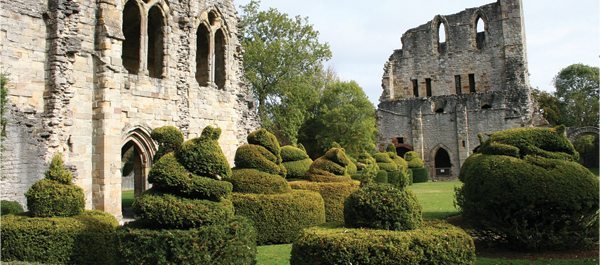
Much Wenlock shares its essential characteristics with scores of small market towns scattered across the English landscape
In just a few short months, more than 16,000 athletes from around the world will gather in London for the 2012 Olympic Games. In time-honored tradition since the first modern Olympics in 1896, the games will open with gala ceremony. In colorful costume, athletes will parade by nation into the new Olympic Stadium in Stratford, East London, where the Olympic village and competition sites have been under construction for years.
In the excitement of the Olympic opening ceremony, few will spare a thought that the traditions of the modern Olympics and the parade of athletes itself were born in a small market town in Shropshire—except maybe the Olympic mascot, Wenlock (the baneful little creature pictured above), named to commemorate the Olympics’ roots in quiet Much Wenlock.
Much Wenlock shares its essential characteristics with scores of small market towns scattered across the English landscape. This particular town of some 3,000 souls is perched on the end of Wenlock Edge, a picture-postcard escarpment of hills running a dozen miles to the southwest toward the Welsh border. To the north lies the modern industrial town of Telford, and the historic River Severn valley of Ironbridge Gorge—the birthplace of the Industrial Revolution.
The streets of Much Wenlock are much quieter than Telford’s, however, and their very narrowness bespeaks an origin long before the advent of modern transportation. In fact, most of the town’s principal streets are Victorian or earlier—sometimes much earlier. Like many medieval English towns, Much Wenlock grew up in the literal and commercial shadow of Wenlock Priory. Like most medieval religious foundations, the rich Cluniac priory itself received its death knell from Henry VIII, but the town lived on.

Wenlock, a baneful little creature and Olympic logo.
In 1841, the young doctor was made justice of the peace and shortly after, commissioner for roads and taxes. That year also, Brookes founded the Agricultural Reading Society, in essence a lending library with adult education classes. Out of that organization Brooke formed the Wenlock Olympian Class in 1850 to hold annual Games “to promote the moral, physical and intellectual improvement of the inhabitants.”
The first Wenlock Olympian Games were held in October 1850, with classic track-and-field events as well as “country sports” such as football, cricket and quoits. The games contested have varied and evolved over the years, but the Wenlock Olympian Games have remained; they are still held annually the second week of July in and around Much Wenlock and draw several thousand athletes of all ages from across Britain.
From the beginning, pomp and circumstance was an important part of the Wenlock Olympics. The games began with a colorful band-led procession of competitors, officials and flag bearers through the decorated town to the meadow that is now permanent home to the games.
In 1860 the Wenlock Olympian Society was formed, and remains the active body governing the games today. Dr. Brookes continued to be the driving force and inspiration of the games and would remain so for the next 30 years. While continuing his medical practice, the indefatigable doctor and town magistrate spurred the renovation of Much Wenlock’s medieval Guildhall and the building of the Corn Exchange, and with his brother, Andrew, brought the railroad to town, setting up the Wenlock and Severn Junction Railway.
With all this, William Penny Brookes was a tireless correspondent, crusading for causes ranging from the recognition of military surgeons to physical education in school curriculums. He also encouraged nascent Olympic games in Greece and inspired Olympic games in the Shropshire county town of Shrewsbury. His lifelong dream, however, was the establishment of an international Olympics.
In 1889 the young French Baron Pierre Coubertin, organizer of the International Congress on Physical Education, was in England studying sports education. Brookes wrote to Coubertin and invited him to visit the Wenlock contests the next year. In October 1890, Coubertin came to witness the Wenlock Olympian Games, and to visit with the good Dr. Brookes, now 81. From discussions between the two men, Coubertin carried away the foundations of what became in 1896 the first international Olympic Games.
Unhappily, William Penny Brookes died in December 1895, just months before the revived games were held in Athens that next April. Coubertin wrote a eulogy for Brookes, acknowledging: “If the Olympic Games that modern Greece has not yet been able to revive still survives today, it is not due to a Greek, but to Dr. William Penny Brookes.”
Today an Olympian Trail around Much Wenlock follows places of interest related to Brookes and the Olympian Games. Indeed, the trail takes in most sites of interest in the small market town, from the doctor’s lifelong home to the field where the games are still held—adjacent to the William Penny Brookes School. Follow the parade of athletes from the Gaskell Arms Hotel, down the pretty Victorian High Street, past the dramatic ruins of Wenlock Priory to Linden Field where the games are centered.
While all sporting eyes are focused on London’s Olympics this summer, Wenlock will celebrate its 126th games. In addition to track and field and several pentathalon events, athletes will compete for Wenlock Olympian medals in equestrian and aquatic events, cricket, badminton, archery, clay pigeon shooting, fencing, volleyball, tennis and golf.
The Wenlock Olympian Games will still feel a world away from London and the international press broadcasting the 2012 Olympiad throughout the world. Dr. Brookes probably would not know quite what to make of the massive production in London, but he would still recognize the games he began and nurtured in Much Wenlock.





Comments